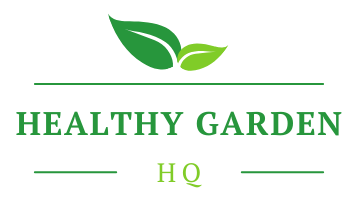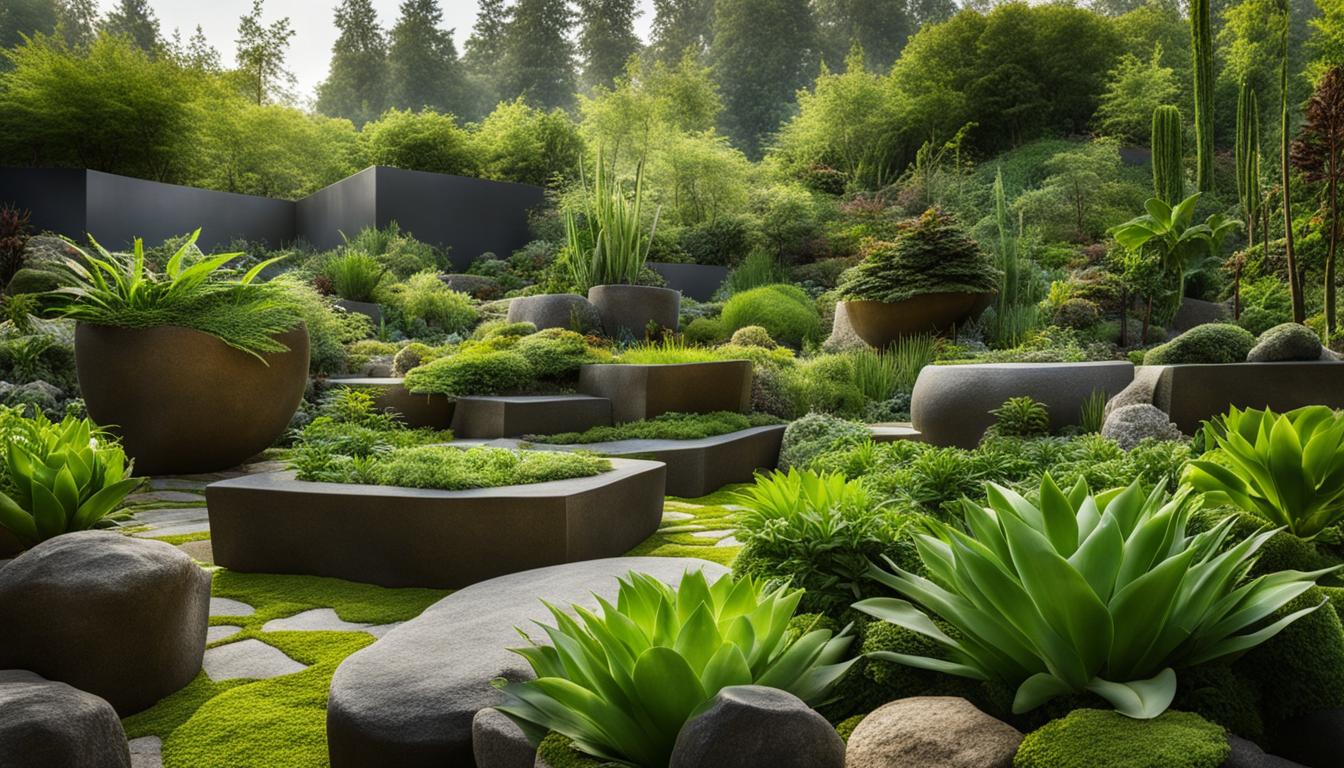Are you eager to create a beautiful garden but limited by space? Look no further than container gardening! Whether you have a small balcony or a spacious backyard, container gardening is a fantastic solution that allows you to enjoy lush greens in any setting. With the right tips and techniques, you can transform your containers into thriving gardens bursting with life. In this article, we will walk you through the essential container gardening tips that will help you get started on your gardening journey.
Key Takeaways:
- Container gardening is an excellent option for gardening enthusiasts with limited space.
- Choose the right containers and plants to create a thriving container garden.
- Proper soil preparation is crucial for the success of your container garden.
- Water your container plants effectively to promote their health and growth.
- Regular care and maintenance will ensure a lush and vibrant container garden.
Soil Preparation Tips for a Lush Container Garden
When it comes to container gardening, proper soil preparation is key to ensuring the health and vitality of your plants. The right soil composition can provide essential nutrients, promote root growth, and improve moisture retention. Here are some essential tips to help you prepare your soil for a lush container garden.
Test the pH Level of Your Soil
Before you start planting, it’s important to test the pH level of your soil. This will help you determine its acidity or alkalinity, which can affect the growth of your plants. Most plants prefer a slightly acidic to neutral soil pH, around 6.0 to 7.0. You can easily find pH testing kits at your local garden center or use a soil testing service for more accurate results.
Add Organic Matter
One of the best ways to improve your soil is by adding organic matter such as compost or well-rotted manure. Organic matter helps to increase soil fertility, improve soil structure, and enhance water and nutrient retention. Mix in a generous amount of organic matter into your potting mix or top-dress your containers with compost to give your plants a nutrient-rich growing environment.
Aerate, Weed, and Mulch
Aerating the soil in your containers is important to ensure proper air circulation and prevent compaction. You can use a small hand tool to gently loosen the soil around the plant roots, being careful not to damage them. Regularly remove any weeds that may compete with your plants for nutrients and moisture. Lastly, mulch the surface of your containers with organic mulch, such as bark chips or straw, to help retain moisture and suppress weed growth.
| Soil Preparation Tips | Benefits |
|---|---|
| Test the pH level of your soil | Ensures optimal growing conditions for your plants |
| Add organic matter | Improves soil structure and fertility |
| Aerate, weed, and mulch | Promotes healthy growth and reduces weed competition |
With these soil preparation tips, you can create a nutrient-rich environment for your container plants to thrive. Remember to test your soil’s pH, add organic matter, and maintain proper aeration, weed control, and mulching practices. By giving your plants a healthy foundation, you’ll set them up for success and enjoy a lush and bountiful container garden.
Watering Techniques for Thriving Container Plants
Effective watering techniques are essential for the health and vitality of your container plants. Insufficient or excessive watering can lead to stress, root rot, and ultimately the demise of your beloved greenery. By following these watering tips, you can ensure your container plants thrive and flourish.
1. Water Deeply and Infrequently
When it comes to watering container plants, it’s important to water deeply and infrequently. This means saturating the soil until water begins to flow out of the drainage holes, ensuring that the moisture reaches the entire root zone. Avoid shallow watering, as it encourages shallow root growth and increases the risk of drought stress.
2. Consider Drip Irrigation or Soaker Hoses
To minimize water waste and deliver water directly to the roots of your plants, consider using a drip irrigation system or soaker hoses. These irrigation methods provide a slow, steady supply of water, reducing evaporation and promoting efficient absorption. Additionally, they help prevent water from splashing onto leaves, reducing the risk of fungal diseases.
3. Mulch to Retain Moisture
Mulching around your container plants is an effective way to retain moisture in the soil and reduce water evaporation. Apply a layer of organic mulch, such as straw or wood chips, around the base of your plants. This will help regulate soil temperature, prevent weed growth, and conserve moisture, reducing the frequency of watering.
By following these watering techniques, you can ensure the health and vitality of your container plants. Remember to monitor the moisture levels regularly and adjust your watering schedule accordingly to meet the specific needs of your plants. With proper watering, your container garden will flourish and bring you joy for seasons to come.
Care and Maintenance for a Lush Container Garden
Proper care and maintenance are essential for keeping your container garden lush and thriving. By following these simple tips and hacks, you can ensure that your plants stay healthy and vibrant throughout the growing season.
Promote Healthy Growth with Regular Pruning and Deadheading
Regular pruning and deadheading are key to promoting healthy growth and vibrant blooms in your container garden. Trim back any overgrown or straggly branches to maintain the desired shape and size of your plants. Deadheading, or removing spent flowers, will encourage the production of new blooms and prevent your plants from wasting energy on seed production. Be sure to use clean and sharp pruning shears to make clean cuts and avoid the spread of diseases.
Fertilize for Nutrient-rich Soil
Fertilizing your container plants is crucial for providing them with the necessary nutrients for optimal growth. Choose a balanced and slow-release fertilizer specifically formulated for container gardening, and follow the instructions for application rates. Over-fertilizing can lead to nutrient burn and damage to your plants, so it’s important to follow the recommended dosage. Regularly fertilize your container garden according to the specific needs of your plants, and adjust the frequency and dosage as necessary.
Monitor for Pests and Diseases
Keeping an eye out for pests and diseases is essential for maintaining a healthy container garden. Inspect your plants regularly for signs of damage or infestation, such as chewed leaves, discoloration, or wilting. If you notice any issues, identify the problem and take appropriate measures to address it promptly. Natural remedies, such as neem oil or insecticidal soap, can be effective against common pests, while copper-based fungicides can help control fungal diseases. Early intervention is key to preventing pests and diseases from spreading and causing widespread damage.
Incorporate these Care and Maintenance Practices for a Lush Container Garden
By incorporating regular pruning and deadheading, fertilizing with a balanced and slow-release fertilizer, and monitoring for pests and diseases, you can ensure that your container garden remains lush and vibrant. Remember to water your plants properly, provide adequate sunlight, and adjust care practices based on the specific needs of your plants. With these essential care and maintenance practices, you’ll enjoy a thriving and beautiful container garden throughout the gardening season.
Creating an Environmentally Friendly Container Garden
Creating a sustainable and environmentally friendly container garden is not only beneficial for the planet but also a rewarding experience. By incorporating eco-friendly practices into your container gardening routine, you can minimize your ecological footprint and contribute to a healthier environment. Here are some tips to help you create an environmentally friendly container garden:
Organic Matter and Crop Rotation
Enrich your soil with organic matter, such as compost or well-rotted manure. This not only improves soil structure and fertility but also reduces the need for chemical fertilizers. Additionally, practice crop rotation by changing the types of plants you grow in your containers each season. This helps prevent nutrient depletion and minimizes the risk of pests and diseases.
Drip Irrigation and Companion Planting
Consider using drip irrigation or soaker hoses to conserve water in your container garden. These methods deliver water directly to the plants’ roots, minimizing water waste through evaporation or runoff. Furthermore, companion planting can naturally deter pests and reduce the need for chemical pesticides. Planting certain flowers and herbs alongside your vegetables or ornamentals can create a balanced ecosystem within your containers.
Composting and Rainwater Harvesting
Implementing composting practices and rainwater harvesting can further enhance the sustainability of your container garden. Composting your kitchen scraps and yard waste creates nutrient-rich compost that can be used to nourish your plants. Similarly, collecting rainwater in barrels or containers allows you to utilize a free and natural water source for your garden, reducing reliance on treated tap water.
| Benefits of an Environmentally Friendly Container Garden |
|---|
| Reduces chemical usage |
| Conserves water resources |
| Promotes biodiversity |
| Improves soil health |
| Minimizes environmental impact |
By implementing these environmentally friendly practices, you can enjoy a thriving container garden while contributing to a healthier planet. So go ahead and create your own green oasis, knowing that you are making a positive difference.
Conclusion
With these essential container gardening tips, you are well-equipped to create a thriving and beautiful garden in any space. Whether you are a beginner or have some experience in gardening, container gardening offers a flexible and rewarding way to cultivate lush greens.
By following proper soil preparation techniques, you can provide your plants with the ideal growing environment. Testing the pH level, adding organic matter, and maintaining soil health through aeration and mulching are key elements for success.
Watering your container plants effectively is crucial for their well-being. Deep and infrequent watering, along with the use of drip irrigation or soaker hoses, ensures that your plants receive the necessary moisture without wastage.
Remember to provide care and maintenance to keep your container garden thriving. Regular pruning, deadheading, and fertilizing will promote healthy growth and vibrant blooms. Stay vigilant against pests and diseases to address any issues promptly.
Lastly, embrace eco-friendly practices to make your container garden sustainable. Opt for organic fertilizers, crop rotation, and companion planting to minimize the use of chemicals. Consider composting and rainwater harvesting to reduce your ecological footprint.
Now that you have the container gardening essentials at your fingertips, it’s time to embark on your gardening journey. Discover the joy of nurturing plants, and create a vibrant oasis of greenery right in your own space. Happy gardening!
FAQ
Why is soil preparation important for container gardening?
Soil preparation is crucial for container gardening because it provides a foundation for your plants to thrive. It helps improve soil structure, fertility, and drainage, ensuring that your plants have the necessary nutrients and aeration to grow.
How do I test the pH level of my soil?
You can test the pH level of your soil using a pH testing kit, which is available at most garden centers. Simply follow the instructions provided with the kit to determine whether your soil is acidic, alkaline, or neutral.
What are some effective watering techniques for container plants?
Water deeply and infrequently, allowing the water to penetrate the root zone. Consider using a drip irrigation system or soaker hoses to deliver water directly to the plants’ roots and minimize water waste. Mulching around plants can help retain moisture and suppress weed growth.
How often should I fertilize my container plants?
It is recommended to fertilize container plants with a balanced and slow-release fertilizer every 4-6 weeks during the growing season. This provides a steady supply of nutrients without overfeeding the plants.
How can I create an environmentally friendly container garden?
Enrich your soil with organic matter, practice crop rotation, and use eco-friendly alternatives such as composting and rainwater harvesting. Consider companion planting to naturally deter pests and reduce the need for chemical fertilizers and pesticides.

